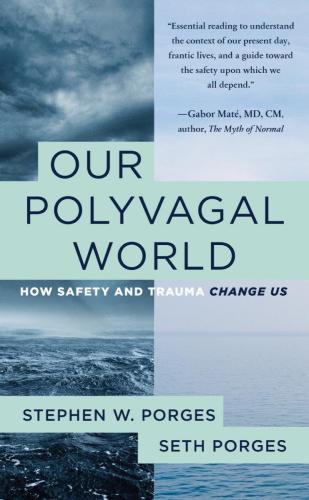Our Polyvagal World: How Safety & Trauma Change Us
| Item Information | |
|---|---|
| Item#: | 9781324030256 |
| Author | Porges & Porges |
| On Hand | 0 |
Since Stephen Porges first proposed the Polyvagal Theory in 1994, its basic idea—that the level of safety we feel impacts our health and happiness—has radically shifted how researchers and clinicians approach trauma interventions and therapeutic interactions. Yet despite its wide acceptance, most of the writing on the topic has been obscured behind clinical texts and scientific jargon.
Our Polyvagal World definitively presents how Polyvagal Theory can be understandable to all and demonstrates how its practical principles are applicable to anyone looking to live their safest, best, healthiest, and happiest life. What emerges is a worldview filled with optimism and hope, and an understanding as to why our bodies sometimes act in ways our brains wish they didn’t.
Filled with actionable advice and real-world examples, this book will change the way you think about your brain, body, and ability to stay calm in a world that feels increasingly overwhelming and stressful.
Stephen Porges cracked the code with his Polyvagal Theory for the physiological mechanism of the human socio–emotional exchange system upon which we build our emotional landscapes. Our Polyvagal World reviews the theory and reminds us that the importance of others is baked into the human genome. When we look at the effects of traumatic events, we must recognize how our nervous system responds and changes, and impacts how we react to stress long after a traumatic incident. Finally, the authors show us that the solutions lay in the interpersonal deployment of the vagal exchange. —Drew Pinsky, MD, FACP, Board Certified Internal Medicine/Addiction Medicine
This wonderfully useful book combines the groundbreaking power of Polyvagal Theory with penetrating clinical insights and warmhearted practical tools—all for greater healing, resilience, and well-being in a stressful world. You can feel the kindness of its authors on every page, with candor about their own father–son relationship and what they’ve learned inside of it. The scientific aspects are explained with masterful clarity. With applications to couples, families, education, and institutions such as prisons, there is value here for every kind of reader. And so timely as we recover from past social disruptions and face new ones. Truly a gem.
—Rick Hanson, PhD, author of Resilient: How to Grow an Unshakable Core of Calm, Strength, and Happiness
In this excellent book, written for the layperson, Porges and Porges outline their important and internationally acclaimed concepts...Polyvagal Theory has made major contributions to our understanding of how stress and trauma changes our bodies and also how, by working with the autonomic nervous system, we can find balance again. As such, it has made major contributions to psychotherapy and the importance of social connectedness in our lives. A must-read for anyone who wants to understand how the autonomic system regulates emotional states and what they can do to cultivate well-being.
—Paul Gilbert, PhD, OBE, author of The Compassionate Mind
Our Polyvagal World is an awesome book...I highly recommend this book to anyone interested in the science of safety and to anyone interested in living a better and healthier life without having to commit to extreme measures. And if both apply to you, this book is a must.
—Diana Fosha, PhD, developer of AEDP, founder of the AEDP Institute, and editor of Undoing Aloneness & the Transformation of Suffering Into Flourishing: AEDP 2.0
In this book, the authors explain the Polyvagal Theory in a simple, relatable way that is easy to absorb and understand…. Reading it inspires moments of personal recognition and life-changing understanding, but it goes one step further to give us the practical tools we need to deepen our social bonds and sense of safety in this stressful modern world. It’s an empowering, hopeful book that you will be glad you read.
—Pat Ogden, PhD, founder of Sensorimotor Psychotherapy Institute and author of Body of Knowledge Card Deck: Sensorimotor Practices for Awareness, Regulation, and Expansion

